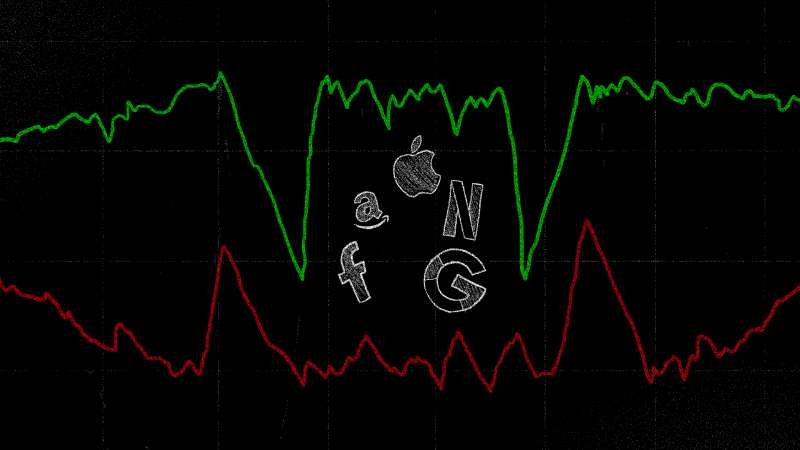 For years, the FAANG stocks reigned supreme. But now that they appear to have lost their bite, is there still a place for these tech giants in your portfolio?
For years, the FAANG stocks reigned supreme. But now that they appear to have lost their bite, is there still a place for these tech giants in your portfolio?
FAANG — an acronym for Facebook$Meta Platforms, Inc.(FB)$ (nowMeta),Apple$Apple(AAPL)$ ,Amazon$Amazon.com(AMZN)$ , Netflix$Netflix(NFLX)$ and Alphabet$Alphabet(GOOG)$ $Alphabet(GOOGL)$ -owned Google— dominated the stock market over that last decade, andled stocks' recovery after the market crashed in March, 2020. During the height of the pandemic, these big techstocksbenefited big time from consumers staying home and spending hours online instead of going out and shopping at big-box retailers.
Many have argued Tesla$Tesla Motors(TSLA)$ , which has garnered somewhat of a cult following, and Microsoft$Microsoft(MSFT)$ should be included in the group. In 2020, the five largest stocks in the overall market, Apple, Microsoft, Amazon, Meta and Tesla, contributed 37% of the market's returns.
But the FAANG stocks (plus their other huge tech counterparts) ain't what they used to be. In 2021, Apple, Microsoft, Amazon, Alphabet Class A and Tesla contributed around just 8% of the market returns, and thus far in 2022, just around 5%, according to data from Morningstar Direct. Amid aselloffin the overall stock market triggered by investors' reaction to the Federal Reserve raising interest rates, the tech-heavy Nasdaq is down around 28% for the year, versus 18% for the S&P 500.And many recent tech earnings didn't give investors much to celebrate.
"We're going back to pre-pandemic growth levels," says J.R. Gondeck, managing director at The Lerner Group. "It's a big adjustment."
What happened to the FAANG stocks?
You really couldn't have a better business than Amazon during lockdown, given that people all over the world wanted to stay home for their health and safety versus venturing out to stores, says Eric Diton, president and managing director at The Wealth Alliance. Meanwhile, Google, which owns YouTube, Facebook and Netflix all enjoyed the fallout of many Americans having little to do but surf the internet. The future growth expectations of the FAANG stocks exploded.
"But trees don't grow to the sky," Diton says. Now, these companies are faced with comparisons to their earlier pandemic earnings, and those numbers are difficult for these companies to compete with as we return to normalcy and head back out to stores, schools and offices.
In April, Netflix delivered some bad news to investors: The streaming service reported a loss of of 200,000 subscribers during the first quarter of the year, marking its first decline in paid users for the company in more than a decade. Meanwhile, Amazon reported slowing growth and rising costs in its first quarter.
And back in February, Meta's stock plummeted 26% in a day, which was the biggest one-day value wipeout ever for a U.S. company, Bloombergreported.
To be fair, it's not just FAANG stocks that aresuffering. In May, the Federal Reserve hiked interest rates by a half percentage point — the biggest hike in more than two decades — after increasing the rate by a quarter percentage point in April amidinflationthat's near a 40-year high. Interest rate hikes tend to make investors nervous because the rate hikes are used to battle rising prices by making it more difficult for businesses and consumers to borrow money, which in turn can also hurt prices of financial assets like stocks.
"Until the Federal Reserve changes its policy, investors just need to remain cautious overall," Gondeck says.
Do the FAANG stocks still deserve a place in your portfolio?
Despite the fact that FAANG has caught on as a catchy name for these stocks, you don't want to lump all these companies together, says David Sekera, the chief U.S. market strategist for Morningstar.
That's because they're completely different companies, with varied valuations and business fundamentals. For example, Morningstar sees Apple's stock as valued at $130 but the stock is currently trading around $140.
"While the company has certainly performed well over time, we do think that the market is over-extrapolating the amount of growth that it's seen over the past couple of years too far into the future," Sekera says, adding that, Apple did well when people were working from home and buying more Macs and iPads. "We think the market is overly optimistic as far as the long-term earnings stream."
But on the other hand, Sekera says the market is overly pessimistic about Meta. Morningstar's analysis places Meta's estimated value at about $384 per share, but the stock is currently trading around just $192.
Amazon, Netflix Alphabet and Microsoft are all stocks Morningstar sees as undervalued and Tesla as fairly valued.
Overall, should these tech giants' stocks still have a place in your portfolio?
"Yes," Diton says. "They're an important part of our economy."
But you don't want them to be overweight in your portfolio, meaning that they take up a higher allocation than they should. Financial advisors recommend regularly rebalancing your investment portfolio.
This will allow you to sell high and buy low, and ensure your portfolio remains as diversified and balanced as it was when you set up your initial investing plan. While the percentage of your portfolio that FAANG stocks should make up will differ for investors — as it depends on your risk tolerance, time horizon and goals — Diton says there's no reason to own more than 10% of your stock allocation in FAANG stocks: "They only represent five companies in the world."
Keep in mind that if you own major indexes like theS&P 500, you already own FAANG stocks — and likely, a big chunk of them. FAANG stocks and Microsoft make up around 21% of the S&P 500, according to S&P Dow Jones Indices. So you want to make sure that your portfolio has a mix of small-, mid-cap and international stocks, in addition to bonds if it makes sense for your specific financial situation.
Comments